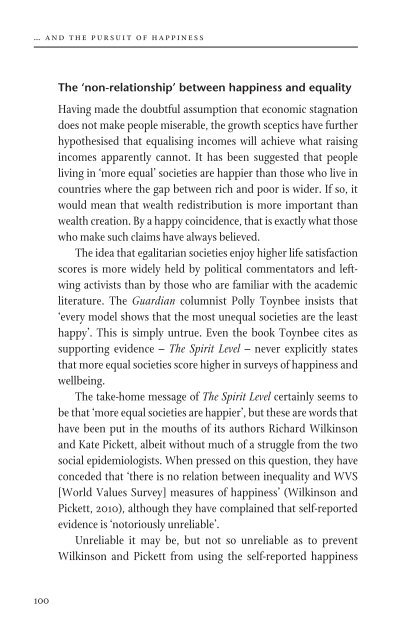… and the Pursuit of Happiness - Institute of Economic Affairs
… and the Pursuit of Happiness - Institute of Economic Affairs
… and the Pursuit of Happiness - Institute of Economic Affairs
You also want an ePaper? Increase the reach of your titles
YUMPU automatically turns print PDFs into web optimized ePapers that Google loves.
<strong>…</strong> <strong>and</strong> <strong>the</strong> pursuit <strong>of</strong> happiness<br />
are more equal countries happier?<br />
The ‘non-relationship’ between happiness <strong>and</strong> equality<br />
Having made <strong>the</strong> doubtful assumption that economic stagnation<br />
does not make people miserable, <strong>the</strong> growth sceptics have fur<strong>the</strong>r<br />
hypo<strong>the</strong>sised that equalising incomes will achieve what raising<br />
incomes apparently cannot. It has been suggested that people<br />
living in ‘more equal’ societies are happier than those who live in<br />
countries where <strong>the</strong> gap between rich <strong>and</strong> poor is wider. If so, it<br />
would mean that wealth redistribution is more important than<br />
wealth creation. By a happy coincidence, that is exactly what those<br />
who make such claims have always believed.<br />
The idea that egalitarian societies enjoy higher life satisfaction<br />
scores is more widely held by political commentators <strong>and</strong> leftwing<br />
activists than by those who are familiar with <strong>the</strong> academic<br />
literature. The Guardian columnist Polly Toynbee insists that<br />
‘every model shows that <strong>the</strong> most unequal societies are <strong>the</strong> least<br />
happy’. This is simply untrue. Even <strong>the</strong> book Toynbee cites as<br />
supporting evidence – The Spirit Level – never explicitly states<br />
that more equal societies score higher in surveys <strong>of</strong> happiness <strong>and</strong><br />
wellbeing.<br />
The take-home message <strong>of</strong> The Spirit Level certainly seems to<br />
be that ‘more equal societies are happier’, but <strong>the</strong>se are words that<br />
have been put in <strong>the</strong> mouths <strong>of</strong> its authors Richard Wilkinson<br />
<strong>and</strong> Kate Pickett, albeit without much <strong>of</strong> a struggle from <strong>the</strong> two<br />
social epidemiologists. When pressed on this question, <strong>the</strong>y have<br />
conceded that ‘<strong>the</strong>re is no relation between inequality <strong>and</strong> WVS<br />
[World Values Survey] measures <strong>of</strong> happiness’ (Wilkinson <strong>and</strong><br />
Pickett, 2010), although <strong>the</strong>y have complained that self-reported<br />
evidence is ‘notoriously unreliable’.<br />
Unreliable it may be, but not so unreliable as to prevent<br />
Wilkinson <strong>and</strong> Pickett from using <strong>the</strong> self-reported happiness<br />
statistics in The Spirit Level’s opening pages to show that ‘happiness<br />
levels fail to rise fur<strong>the</strong>r as rich countries get still richer’ (ibid.:<br />
8). 2 With this nod <strong>of</strong> <strong>the</strong> head to <strong>the</strong> Easterlin paradox, <strong>the</strong>y spend<br />
<strong>the</strong> rest <strong>of</strong> <strong>the</strong> book making <strong>the</strong> case that although economic<br />
growth has reached <strong>the</strong> limits <strong>of</strong> utility, reducing income<br />
inequality will improve a nation’s performance in everything from<br />
infant mortality to <strong>the</strong> amount <strong>of</strong> rubbish that is recycled.<br />
That <strong>the</strong>se improvements will lead to greater happiness is so<br />
strongly implied that Toynbee can be forgiven for her error. But<br />
while <strong>the</strong> book includes dozens <strong>of</strong> graphs showing how nations<br />
perform across various criteria, <strong>the</strong> happiness data are never put<br />
to <strong>the</strong> same test. Although <strong>the</strong> happiness surveys are considered<br />
reliable enough to challenge <strong>the</strong> conventional belief that higher<br />
incomes lead to greater happiness, <strong>the</strong> hypo<strong>the</strong>sis that greater<br />
income equality leads to greater happiness is never required to<br />
meet <strong>the</strong> same burden <strong>of</strong> pro<strong>of</strong>. There is a good reason for that.<br />
Figure 10 shows <strong>the</strong> total lack <strong>of</strong> correlation between income<br />
inequality <strong>and</strong> happiness in <strong>the</strong> world’s richest countries.<br />
Self-described egalitarians are eager to cite <strong>the</strong> straight line <strong>of</strong><br />
subjective wellbeing since 1965 as damning pro<strong>of</strong> that economic<br />
growth is useless, but <strong>the</strong>y seldom mention that inequality has<br />
also had no observable effect on happiness in <strong>the</strong> last 50 years. In<br />
light <strong>of</strong> Easterlin’s work, no test could be more obvious than to<br />
compare rates <strong>of</strong> inequality with levels <strong>of</strong> happiness over time, but<br />
remarkably few social scientists have bo<strong>the</strong>red to do so. Arthur C.<br />
Brooks is a rare exception (Brooks, 2007). By studying <strong>the</strong> results<br />
<strong>of</strong> America’s General Social Survey (GSS), he found a conspicuous<br />
lack <strong>of</strong> association between <strong>the</strong> two variables:<br />
2 O<strong>the</strong>r self-reported measures such as trust <strong>and</strong> child wellbeing are also included<br />
in The Spirit Level.<br />
100 101












